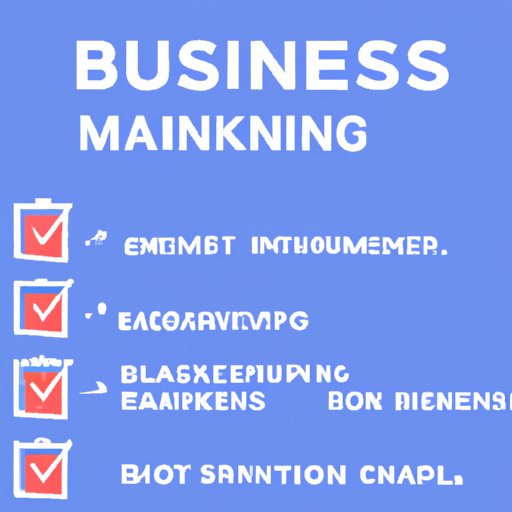Introduction
Starting a business is a big undertaking that requires a lot of planning and foresight. It’s important to have a comprehensive checklist of the steps and processes involved in launching a successful business. In this article, we’ll outline the steps you should take when starting a business and provide tips on how to make the process easier.
Outline the Steps Involved in Starting a Business
Before you jump into the world of entrepreneurship, it’s important to understand the steps involved in starting a business. The following are some of the most important steps:
Identify Target Market
The first step in starting a business is to identify your target market. Who are your potential customers? What do they need or want? How will you reach them? These are all important questions to answer before you move forward with your business.
Create a Business Plan
Once you have identified your target market, the next step is to create a business plan. Your business plan should include information about your company, your products and services, your financial projections, and your marketing strategies. This document will serve as a roadmap for your business and help you stay focused and organized.
Choose a Business Structure
Your business structure will determine how you organize and manage your business. Common structures include sole proprietorships, partnerships, LLCs, and corporations. Each structure has its own advantages and disadvantages, so it’s important to research each option carefully before making a decision.
Register Your Business
Once you’ve chosen a business structure, you’ll need to register your business with the appropriate state and local agencies. This process typically involves submitting paperwork and paying filing fees. It’s important to make sure your business is properly registered so that you can legally operate your business.
Obtain Necessary Licenses and Permits
Depending on the type of business you are starting, you may be required to obtain certain licenses and permits. For example, if you are opening a restaurant, you may need a food service license. Be sure to research the requirements for your particular business and obtain any necessary licenses or permits before you begin operations.

Create a Timeline for Completing Each Step
Creating a timeline for completing each step of the process is essential for staying organized and on track. Start by estimating how long each task will take and then make a list of all the tasks you need to complete. Finally, set deadlines for completing each task so that you can stay on top of your progress.
Identify Potential Funding Sources
Securing adequate funding is an important part of starting a business. First, analyze your personal finances and determine whether you have the resources to fund your business. If not, there are several other options available, such as small business loans, grants, and crowdfunding. Research the different funding sources to find one that best fits your needs.

Research Local Regulations and Licenses Required
It’s also important to research the state and local regulations and licenses required for your business. This can vary depending on the type of business you are starting and the location. Consult an attorney or accountant to ensure you are in compliance with all applicable laws.
Hire Professional Advisors, such as Accountants and Lawyers
As you get closer to starting your business, it’s important to hire the right professionals to help you. Determine what services you need and then find professionals with the appropriate experience. Ask other business owners for referrals to trusted professionals.
Develop a Marketing Strategy
Once you’ve taken care of the legal and financial aspects of starting a business, it’s time to develop a marketing strategy. Define your brand, utilize social media, and consider investing in advertising. Keep in mind that your marketing efforts should focus on reaching and engaging your target market.
Conclusion
Starting a business can be overwhelming, but it doesn’t have to be. With a comprehensive checklist and the right professionals to help you, you can launch your business with confidence. Remember to research your target market, create a business plan, choose a business structure, register your business, obtain necessary licenses and permits, identify potential funding sources, research local regulations and licenses required, hire professional advisors, and develop a marketing strategy.
By following this checklist, you can be well on your way to launching a successful business. Good luck!
(Note: Is this article not meeting your expectations? Do you have knowledge or insights to share? Unlock new opportunities and expand your reach by joining our authors team. Click Registration to join us and share your expertise with our readers.)
